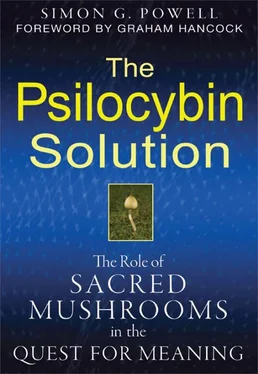In The Archaic Revival, McKenna spoke of the UFO as:
An autonomous psychic entity that has slipped from the control of the ego and approaches laden with the “Otherness” of the unconscious. As one looks into it one beholds oneself, one’s world information field, all deployed in a strange, distant, almost transhumanly cool way, which links it to the myth of the extraterrestrial. The extraterrestrial is the human Oversoul in its general and particular expression on the planet. {32} 32 3. McKenna, The Archaic Revival, 60.
Here may lie the explanation for the rampant and often far-fetched stories of actual UFO sightings and alien encounters not reserved to closed-eyes visions. Perhaps for some people the Other emerges into the perceived world of external reality, although this would more than likely represent a genuine hallucination.
McKenna’s use of the term Oversoul is yet another way of referring to the Other. Whereas McKenna readily assumed the Other to be the creative source of sacred visions, I am being more specific by asserting that an experience of the Other results from an inherent property of information just as the individual mind results from an inherent property of information. Through the redemptive action of sacramental alkaloids like psilocybin, the Other is able to become manifest and flow through the neuronal architecture of the brain. The Other, or Oversoul, is information, or at least it is the creative organizing principle underlying brain-based information integration and brain-based information patterning. Its language is that of symbols and cultural images, futuristically alien or otherwise.
To sum up the far-reaching speculations presented thus far: whether personal or universal, information becomes incorporated into entheogenic visions in a novel and creative way such that a definite message or meaning is conveyed, or at least appears to be conveyed. The resulting overwhelming confrontation with a spiritual intelligence is the result of information integration to the point where the integrative process appears to be alive, purposeful, and distinct from the self or ego. This is the transcendental Other, a sentient informative entity that is not us but something very closely related to us.
Can, or Should, We Banish the Other?
Alternatively, a cool, restrained, and skeptical approach might be to suggest that the self-organizing patterning of neuronal information does not reflect an information-composed Other at all, but is just the result of some incidental property of information. Just as gravity is a property of the Universe acting everywhere (on a macroscopic scale) to draw physical material together, so too might there be some inherent but incidental property of psychological material (or neuronal information) that acts to organize it. Although this organizational process can, if boosted by psilocybin or endogenous brain chemicals like DMT, result in the perception of a communicating Other, this Other will in fact be just a kind of illusory side effect promoted by the experience.
Having said that, however, in terms of the visionary shamanic experience, it is clearly so powerful and so emotionally charged that the inference of a transcendental Other is historically well established and seems indicative that something important and hitherto unknown to psychological science is occurring. As many Westerners who have sampled entheogenic flora will readily attest (this includes those brave anthropologists who have taken Amazonian psychedelic brews and experienced numinous visions), it is not simply “primitive” inference or hearsay that has led native shamans to speak of a perceived contact with gods or spirits. It is rather the case that the sacred nature of the entheogenic experience appears so dramatic, so persuasive, that the inference of an Other becomes unavoidable.
Even if we did still opt for the restrained armchair-bound explanation, it is not incompatible with the notion of the Other, but merely a kind of clever avoidance and reluctance to invoke a “big idea” that we are not accustomed to. For to reduce the Other to merely an incidental organizing principle inherent in information, with no real purpose, is like saying that normal consciousness is merely an incidental neuronal effect without any real purpose. But since we know that normal consciousness is purposeful (we have will, more or less), then it is tenable that the Other represents a kind of purposeful will above and beyond that of the individual ego. Indeed, if we also consider the many other self-organizing properties of the Universe—which are deemed fundamental—then the Other might well represent a similarly fundamental aspect of Nature, one that “comes alive” when conditions in the human cortex are appropriate.
Yet, if pushed, is it really necessary to speak of a dissociated communicating presence when a less fanciful explanation will at least partially suffice? Aren’t we in danger of becoming overtly religious by invoking a kind of superintelligence dissociated from the individual self? Maybe so. But if the notion of an intentional Other still seems too bizarre to the critical reader, the idea can be further defended by examining a common analogous situation in which we infer a non-self-based other. After all, do we not all assume without any doubt whatsoever that other conscious minds really exist? And yet this is also a big inference based solely on subjective experience. Let us pursue this, because it is, strangely enough, relevant to the validity of inferring purposeful entities.
To posit a transcendental communicating Other is really no different to the tacit inference that other human minds exist. Both these sorts of other, the big O and the little o, are equally conceived of as the focus points of intentional information processing. Yet there might not be other conscious minds apart from our own. Or there might be just a few. We cannot absolutely prove that others possess conscious minds like our own since we have access only to their external manifestations. Other people may in fact be, god forbid, soulless automata, no more than mechanical zombies masquerading as conscious beings. For all you know, you might be the only conscious entity existing, for what conscious experience are you familiar with but your own? Indeed, when Descartes began his philosophical career, he wanted to know what he could be absolutely certain about, with no room for doubt whatsoever. Gazing out of an ornate seventeenth-century window, he wondered if perhaps all of reality was a cunningly designed trick played on him by some artful demon with infinite powers of trickery. Entertaining such a sinister scenario, Descartes came to the conclusion that the only thing that he knew to be real for sure was the existence of his own self—he thought, therefore he was. There could be no doubting that at least. This deceptively simple realization became the bedrock on which much of his subsequent philosophy and science were based.
The philosophical belief that only one’s own self really exists is known as solipsism. As weird as it might sound, it is a theoretical stance that many might be tempted to adopt, even for the sake of just playing with the idea in order to annoy and confuse friends. The point of raising this issue is that all of us make a big leap of faith in accepting that other minds like our own really do exist, and this way of thinking “works,” so much so that most people have not the faintest idea what solipsism is and never even come to entertain the idea despite it being an essentially reasonable piece of personal philosophy.
Directly analogous with our tacit assumption that other conscious minds like our own exist is the inference that an intelligent, communicating Other lies at the heart of shamanic visions. This seems unavoidable if one is experiencing powerful visionary effects from entheogenic agents, and this makes it a valid and workable way of explaining the experience despite its distinct tone of grandeur. I would therefore claim that the notion of a transcendental Other is reasonable in light of the remarkably integrative information processing occurring in the entheogenimbued brain. Such chemically inspired modification of neuronal activity is experienced as being so rich in symbology and meaning that for all intents and purposes it can be considered the result of a living, intelligent, and communicating agency made of information, an agency whose intent can become activated and focused should the chemical conditions of the human cortex be so conducive. Information must indeed be in some sense alive.
Читать дальше










